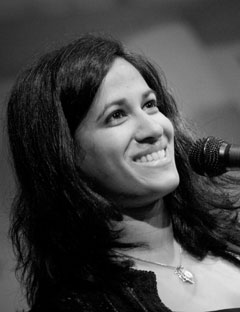Ilankai Tamil Sangam28th Year on the Web Association of Tamils of Sri Lanka in the USA |
|||
 Home Home Archives Archives |
Confronting the Truth, Even When It Hurtsby V.V. Ganeshananthan, Esquire, March 11, 2008
The author of Love Marriage, out in April, discusses how fact and imagination play into her writing. “He would have died, and he thought about this, and he swallowed, realizing the words that had been on his tongue at the moment that misdirected bullet was fired: O God, it's not me, I'm not even Tamil.” I read all my writing aloud to myself, which is a time-consuming process. One of my first writing teachers, Jamaica Kincaid, insisted on this, and I think she is correct: it forces out inconsistencies and untruths and imprecise words. If you are reading a story in the first person, it also puts you in the character’s head in a way that reading silently cannot duplicate. In this case, reading this sentence aloud, I am also forced to say, “O God, it’s not me, I’m not even Tamil.” I was born in the United States, to Sri Lankan parents, and for a variety of reasons related to the war, I do not go to Sri Lanka very often. In fact, I have only been there twice in my adult life, and those visits total less than two months. I have spent no more than two weeks in Jaffna, where much of the book takes place. Still, I do all the research I can. I read and interview people and consult academics and activists and relatives and nonrelatives. My training as a journalist helps with this. And the research expands my imagination. I know more, and I imagine more -- and vice versa. Every story someone tells me creates another one in my head. Sometimes they might be connected by only the tiniest string of emotion or coincidence. But two of my friends who are academics actually fact-checked my book -- so I know that everything in it is plausible. I try to keep expanding my ideas by meeting with anyone Sri Lankan or with an interest in Sri Lanka. My lack of access to the country itself frustrates me. But in other ways, it has obviously strengthened my work by forcing me to imagine situations like the bus incident as intensely as possible, and to focus on the uncomfortable emotion rather than the facts -- because the facts are so hard to get. In some ways it might be easier to use the facts to distance myself than to put myself fully into his head. This way, I have to challenge myself to imagine it completely, and I have to reimagine it every day. And I have to know what my characters would do in those circumstances, when their mortality and morality are at stake. Over a long period of reading my own writing I have realized that I am obsessed with both these things: mortality and morality. I am very interested in what people do when they are forced into horrible situations, and some people’s certainty that they can remain moral regardless of what happens. I sit around and think about that and wonder, How do you know? You only know if you have to know. And most of us don’t. --As told to Anya Yurchyshyn Vasugi V. Ganeshananthan’s debut novel, Love Marriage, will be release by Random House in April. She has written and reported for The Atlantic Monthly, The Wall Street Journal, The Chronicle of Higher Education, Sepia Mutiny, and The American Prospect, among others. She is the vice president of the South Asian Journalists Association and a member of the graduate board of The Harvard Crimson.
| ||
 This sentence is from my first novel, Love Marriage. The incident is based on a story that a relative told me long ago. The character, Kumaran, an ethnic Tamil, is riding the bus in Sri Lanka. Soldiers stop the bus because they are looking for someone Tamil. Maybe that person is suspected of something, or maybe they want him for some other reason. A militant Tamil separatist group, the Tamil Tigers, has recently formed and begun committing sporadic acts of violence. But many Tamils in Sri Lanka have no affiliation with this movement, and these people are afraid. And with good reason: The soldiers point a gun in Kumaran’s direction, and they shoot the person behind him. But the bullet grazes him on its way to its actual target. He becomes collateral damage physically, but a direct moral casualty. He is unable to forgive the soldiers or himself for what he has almost said.
This sentence is from my first novel, Love Marriage. The incident is based on a story that a relative told me long ago. The character, Kumaran, an ethnic Tamil, is riding the bus in Sri Lanka. Soldiers stop the bus because they are looking for someone Tamil. Maybe that person is suspected of something, or maybe they want him for some other reason. A militant Tamil separatist group, the Tamil Tigers, has recently formed and begun committing sporadic acts of violence. But many Tamils in Sri Lanka have no affiliation with this movement, and these people are afraid. And with good reason: The soldiers point a gun in Kumaran’s direction, and they shoot the person behind him. But the bullet grazes him on its way to its actual target. He becomes collateral damage physically, but a direct moral casualty. He is unable to forgive the soldiers or himself for what he has almost said. 